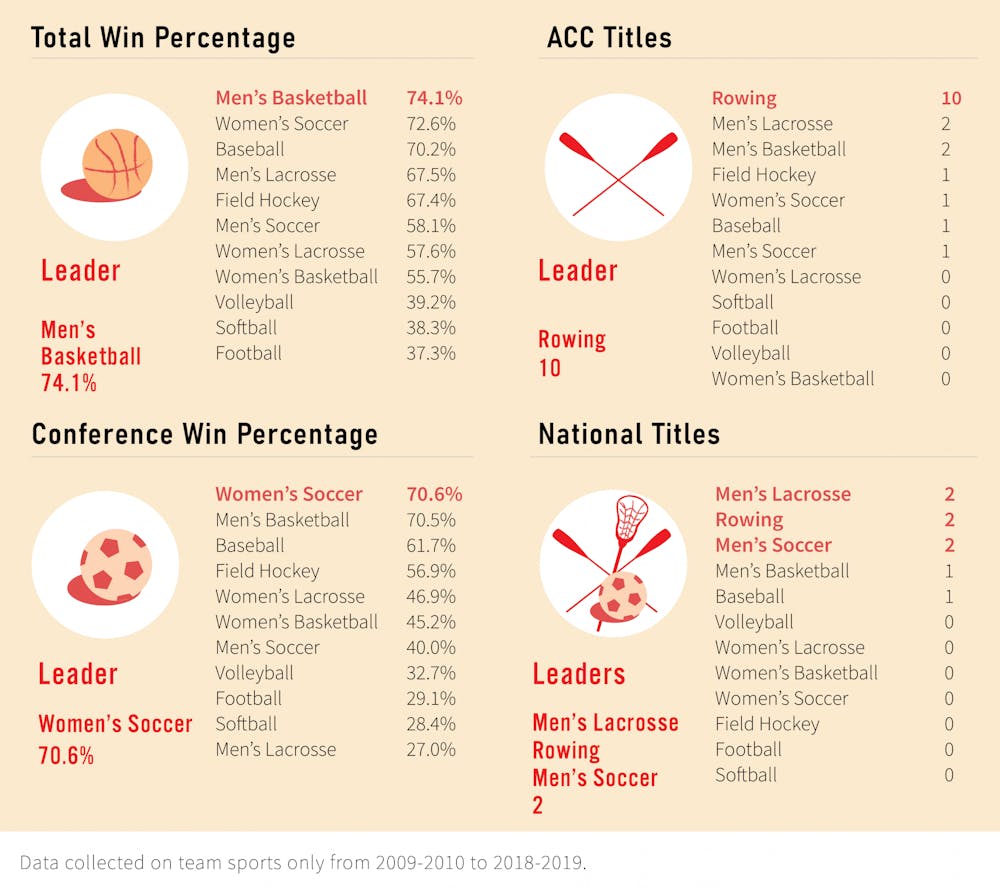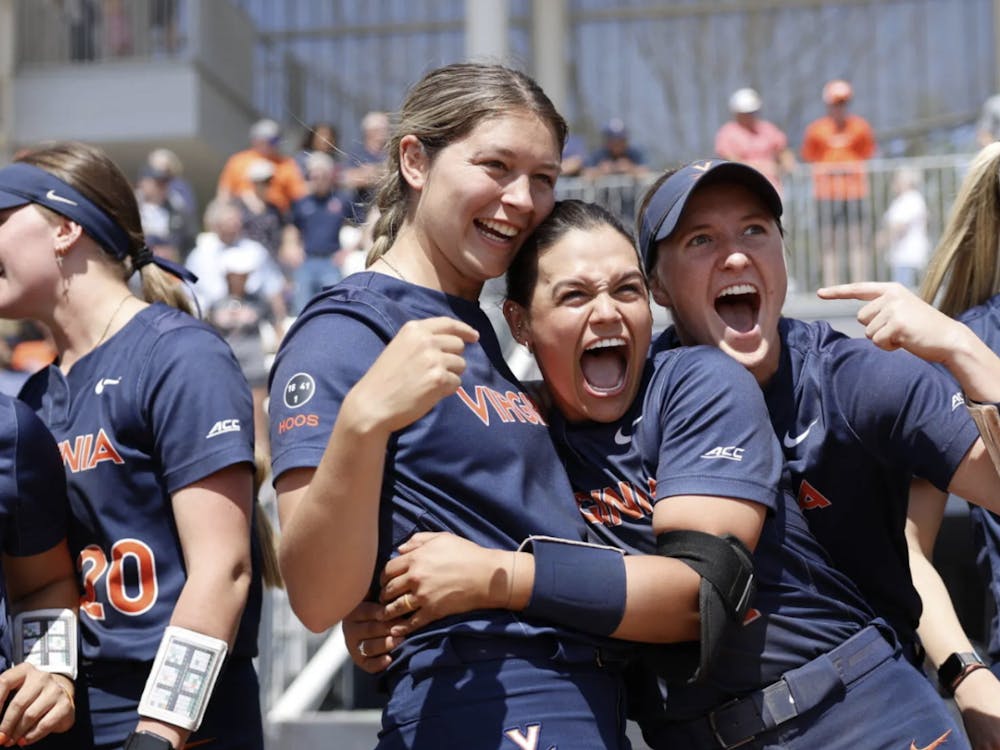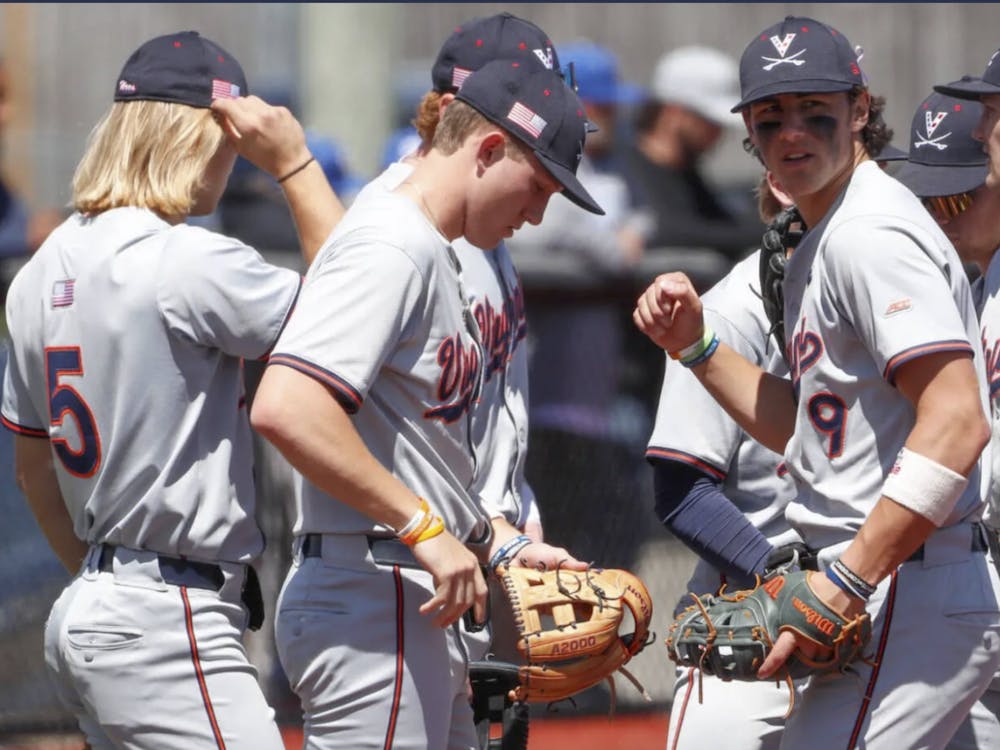Virginia Athletics is one of the top college sports programs in the country. In total, Virginia sports teams have won 27 NCAA team championships and 138 ACC titles. The Cavaliers have been particularly successful in the last decade, winning 61 national and conference titles since 2009. The Cavaliers’ recent excellence leads to an interesting question — among Virginia’s 12 team sports, which has been the most successful over the last 10 years?
Before discussing the data, a couple of details should be noted. First, the period of analysis was limited to the 10 seasons from 2009-10 to 2018-19. To ensure fairness, the most recent 2019-20 season was excluded since some teams weren’t able to finish their years. Second, since team sports are the most directly comparable, Virginia’s 15 individual sports — including highly successful programs like swimming and diving and men’s tennis — were not considered. Third, and most importantly, each sport has nuances — in competition format, quality of opposition and more — so it's virtually impossible to draw conclusive comparisons. Instead, this analysis aims to provide a broad overview of each team’s relative performance in recent history using a few simple metrics.
With the stage set, let’s get into the analysis and begin to determine which Virginia team was the most successful over the last decade.
Overall win percentage
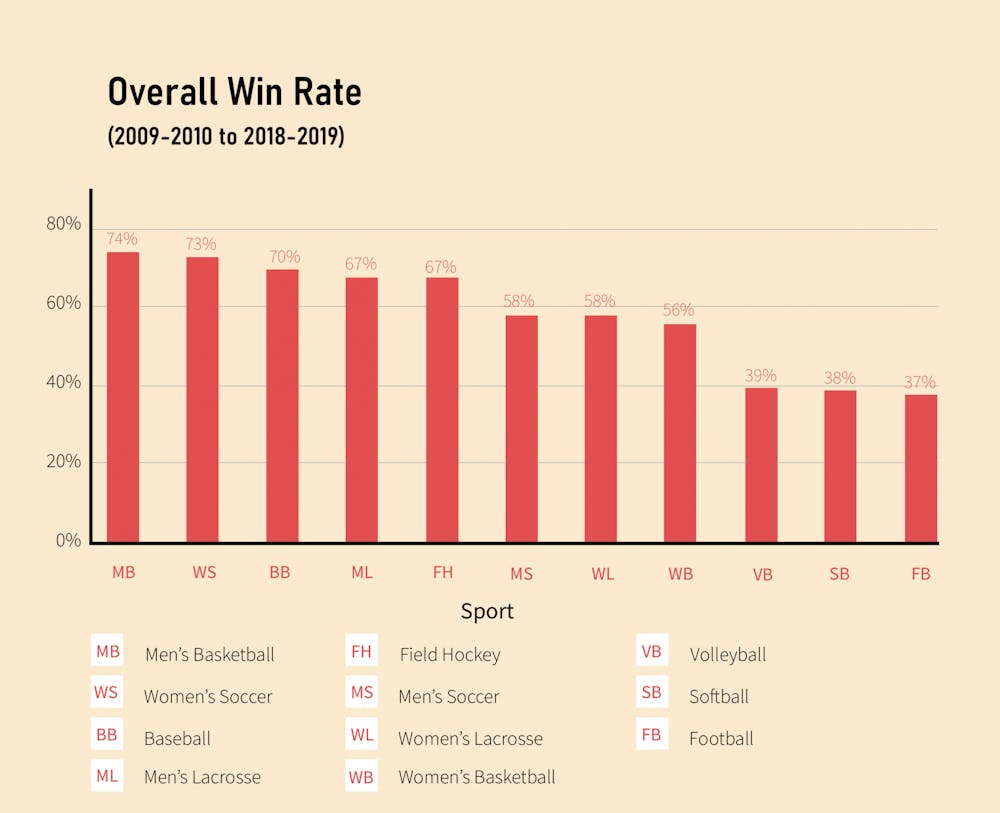
Over the last 10 years, Virginia teams excelled across the board. Eight teams won over 50 percent of their games and the remaining three won at least a third of their matches. Rowing was excluded from this part of the analysis since the sport doesn’t use traditional win-loss records.
Leading the pack is men’s basketball, with a 74.1 percent win rate since the 2009-10 season, which also happens to be Coach Tony Bennett’s first season at the helm. Women’s soccer, baseball, men’s lacrosse and field hockey round out the top five, all winning over two-thirds of their games.
Men’s soccer, women’s lacrosse and women’s basketball fall just outside the upper tier — winning more games than they lost but not at a particularly high rate. Moreover, volleyball and softball have won just 39.2 percent and 38.3 percent of their games since 2009-10, respectively, making them the worst-performing women’s teams in this category.
Notably, Virginia’s most financially successful sport — football — also happens to have the worst win rate. While the team is certainly popular among fans, the football team has only won 37.4 percent of its games from 2009-10 to 2018-19. That being said, since the arrival of Coach Bronco Mendenhall in 2016, Virginia football has won 48.1 percent of its games, when including the 2019 fall season.
Conference win percentage

Competing in the challenging ACC, Virginia teams’ conference win rates are considerably worse than their overall win rates. Just four teams — women’s soccer, men’s basketball, baseball and field hockey — have won more ACC games than not over the last 10 years.
Virginia’s historically great women’s soccer program — led by world-class Coach Steve Swanson and numerous standout players over the years — had the highest ACC win rate at 70.6 percent. Women’s soccer just barely edged out men’s basketball, which had a 70.5 percent win rate against conference foes, at the top of the category.
While a handful of teams played well against both conference and non-conference opponents, numerous teams performed significantly worse in the ACC. Men’s lacrosse had the largest discrepancy with the worst ACC win rate, despite having the fourth-best overall win percentage. Over the last 10 years, men’s lacrosse won just 27 percent of its ACC matches — over 40 percentage points less than its total win rate in that span.
Conference titles
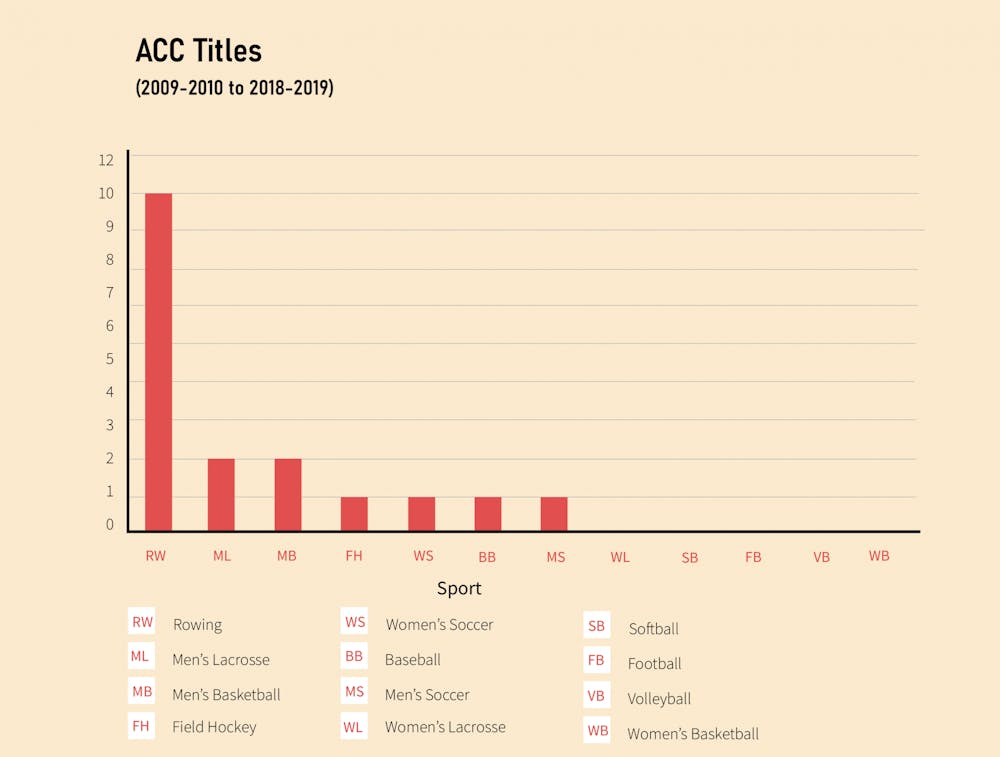
In addition to winning frequently, postseason titles are also an important measure of success in sports. In terms of ACC team titles, Virginia rowing is the runaway leader with 10 championships from 2009-10 to 2018-19, meaning the team won every single year. In fact, Virginia’s rowing team has won 19 of the 20 ACC championships that have ever taken place — a testament to its dominance of the conference.
Men’s lacrosse and men’s basketball are the only other teams with multiple ACC titles over the last 10 years — each have won a pair of championships. Four teams — field hockey, women’s soccer, baseball and men’s soccer — have all won a single title.
Interestingly, of the five teams that didn’t win an ACC title in the last decade, women’s lacrosse, softball and women’s basketball have won conference championships at some point in history, while football and volleyball have never won a postseason conference title.
National championships

Altogether, the Virginia teams included in this analysis won eight national championships from 2009-10 to 2018-19. Three teams are tied for the most titles as men’s lacrosse, men’s soccer and rowing all won twice. While they may not be very consistent, men’s lacrosse and men’s soccer both join rowing as the only Virginia teams with multiple national titles in the last decade.
Two other teams have also won national championships recently. In 2015 and 2019, respectively, baseball and men’s basketball won their first and only NCAA titles. Clearly, not only were Virginia’s traditionally high-performing programs successful in the last decade, but a number of teams have also joined them on the national stage.
However, postseason success isn’t binary, so how well a team performs in their national competition was also considered, even if it didn’t win the title. In terms of top-eight finishes, rowing and field hockey lead the pack with eight and five, respectively. Men’s lacrosse, women’s lacrosse and women’s soccer have four each. Moving on to top-four finishes, four teams are all tied at the top with three each — baseball, men’s lacrosse, men’s soccer and rowing.
Interestingly, despite a combined 13 top-eight finishes, field hockey, women’s lacrosse and women’s soccer haven’t won a single title as of late. In contrast, men’s soccer converted just three quarterfinals appearances from 2009-10 to 2018-19 into two national titles.
It’s important to note, when considering postseason titles, that the format of each sport’s national championship varies greatly. For instance, the NCAA Division I men’s basketball tournament consists of a field of 64 teams, while field hockey’s NCAA tournament has just 16 participants. Moreover, rowing doesn’t have a tournament at all, competing in a series of regattas against 21 other teams instead.
An inconclusive conclusion
As mentioned earlier, there is no way of definitively knowing which Virginia team sport has performed the best over the last 10 years. If you value consistency, then men’s basketball and women’s soccer are compelling options. If you prioritize titles, then the rowing team stands out. If you value NCAA Tournament performances, men’s soccer and men’s lacrosse must also be considered.
Regardless of this analysis’ results, Virginia fans can rejoice in the Cavaliers’ recent successes. Driven by strong institutional support, excellent coaching and an influx of talented student-athletes, Virginia sports teams accomplished great things over the last decade. Now, we’ll have to see if they can maintain this level of success in the decades to come.
Graphics by Angela Chen.

